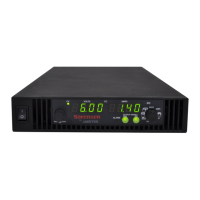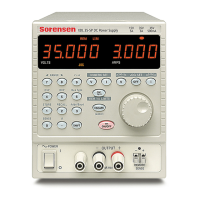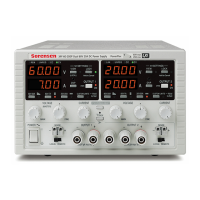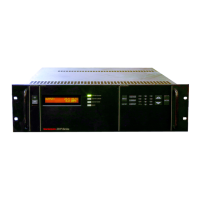DC Asterion Series Overview
M330460-01 Rev A 3-39
anti-clockwise until the OVP is programmed to about 80-90% of the maximum
rated output voltage.
7. On the Dashboard screen, rotate the rotary knob to select the “Voltage”
text box in the “Setting” section. Press the rotary knob to highlight the
voltage value. Rotate the rotary knob clockwise and observe the
voltage display in the “Measure” section on the Dashboard screen
begin to accelerate up. When the output voltage exceeds the OVP trip
point, the OVP warning screen will be displayed saying that the output
tripped due to an OVP fault. Refer to Figure 3-80.
8. The Output State will be programmed to OFF, and the Voltage, Current, and
OVP settings will retain their previous settings.
9. Press “Clear OVP” on OVP Warning screen and the fault screen will clear. The
Dashboard screen will be displayed, and the output will remain disabled.
10. Using the Dashboard screen, program the OVP setting as appropriate for the
application. If OVP is not used, then “OVP” programming may be set at
maximum, approximately 110% of the rated output voltage of the supply.
11. If OVP mode did not function as indicated above, verify the setup and perform
the check again. If the function continues to fail, contact the factory for
assistance.
3.2.4 Constant-Power Mode
The Constant-Power Mode allows the supply to regulate the output to a constant
power setting as opposed to the more common constant voltage or constant current
modes of operation. (Note: Constant Power mode is intended primarily for loads with
response times greater than approximately 10ms). While in this mode, the supply will
continually adjust the voltage and current levels to attempt to maintain a constant
power to the load. To provide additional protection for the load, voltage, and current
limits may be set while in the Constant-Power mode. If the unit cannot regulate to the
Constant Power setting due to load conditions, it will regulate either at the voltage or
current limit depending on the load demand. Refer to Figure 3-96.
Figure 3-96. Constant-Power Example

